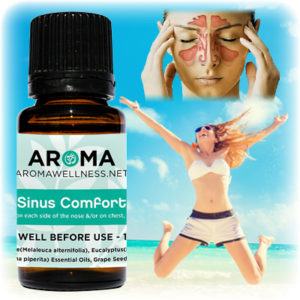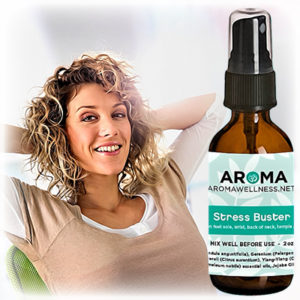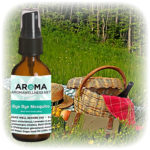Do you know……..If you are dealing with a persistent cold-cough, you likely have a build-up of mucus in chest. This is not a life-threatening condition, but is uncomfortable, makes it difficult to breathe or sleep, with constant runny nose and annoying cough. If left untreated, can lead to additional complications. Stuffy sinuses doesn’t happen only during cold and flu season, but could be due to:
Allergies: can be caused by outdoor irritants (as pollen, grass, trees), or by indoor irritants (as pets, dust, mold).
Weather: nasal tissues can become inflamed from indoor heating in the winter, air conditioning in the summer, and overall dryness any time of year.
Deviated Septum: is the wall that separates the left and right nasal passage. If it leans over to one side, it could block that air passage and feeling congested.
Sinus Infection 
Essential oils have been used for centuries as a natural way to support emotional and physical health. Essential oils are a natural alternative to synthetic medications with proper knowledge of its uses and the safety. Following oils may be able to relieve symptoms of congestion, sinus infections:
Eucalyptus Essential Oil: is strong, pungent, antiseptic, antiviral and antibacterial, stimulate circulation and detox the body. It has a minty quality and is often found in cough drops, syrups, and Vick Vapo Rub. 1,8 cineole, which is the main component of Eucalyptus Oil is a natural cough suppressant.
Peppermint Essential Oil: has strong minty scent, is anti-inflammatory, antibacterial, and antiseptic, an effective pain reliever by reducing inflammation and stimulating blood flow, have cooling effect, stimulate the digestive and respiratory system,
Tea tree Essential Oil: is antibacterial, antiviral, and antimicrobial, antiseptic, anti-inflammatory, can rapidly treat cold sores, can relieve congestion, ease a cough, soothe a sore throat, and stimulate immune system.
Ginger Essential Oil: is antibacterial, analgesic, anti-inflammatory, an effective stimulating effects on the mind, the digestive and the respiratory systems, that relieves constipation, vomiting, and nausea.
Cedarwood Essential Oil: has woodsy, musky aroma. It’s an expectorant known for its ability to loosen phlegm, a sedative that reduces runny noses, coughing, and watery eyes. Detox the body.
Oregano Essential Oil: is antibacterial, antifungal, antiviral, boost immune system, fight infections, and sinus congestion.
Lemon Essential Oil: is antimicrobial because of two dominant compounds found in the oil, limonene and b-pinene, antibacterial, antioxidant and anti-inflammatory, boost immune system, stimulates lymphatic drainage to help with cough, fight respiratory conditions, and allergies.
VISIT AROMAWELLNESS.NET TO ORDER YOUR OILS
Best ways to use Essential Oils to relieve cold and congestion is:
Through direct inhalation
Steam inhalation
Diffusing
Applying topically on chest, temple area
Cold & Congestion Blend
5 drops Cedarwood Essential Oil
5 drops Tea tree Essential Oil
5 drops Eucalyptus Essential Oil
3 drops Lemon Essential Oil
1oz (30ml) Grape Seed Oil
Add Essential Oils in a 1oz dark glass dropper bottle, pour 30ml Grape Seed oil, close the bottle, label, and mix gently. Apply externally to chest and neck and on temple 2-3 times or as needed.
Om Healing………..Uma
(Founder of AromaWellness)
visit aromawellness.net, to order
Call 414-793-8645, to schedule your consultation appointment







 tia occurs when nerve cells in the brain become damaged causing a variety of brain illnesses that affect memory, thinking, behavior, orientation, comprehension, language, judgement, learning capacity, and ability to perform everyday activities. Consequently, there are various types of dementia, which are generally categorized by two factors: the section of the brain damaged, and the condition. Dementia is overwhelming not only for the people who have it, but also for their caregivers and takes devastating emotional, financial, and physical toll on families. Based on the high number of individuals affected, dementia is one of the leading cause of dependency and mental impairment among the elderly population. The signs and symptoms linked to dementia can be understood in three stages:
tia occurs when nerve cells in the brain become damaged causing a variety of brain illnesses that affect memory, thinking, behavior, orientation, comprehension, language, judgement, learning capacity, and ability to perform everyday activities. Consequently, there are various types of dementia, which are generally categorized by two factors: the section of the brain damaged, and the condition. Dementia is overwhelming not only for the people who have it, but also for their caregivers and takes devastating emotional, financial, and physical toll on families. Based on the high number of individuals affected, dementia is one of the leading cause of dependency and mental impairment among the elderly population. The signs and symptoms linked to dementia can be understood in three stages:
Recent Comments